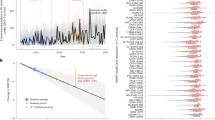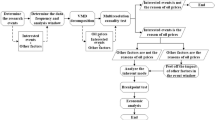Abstract
Many countries have cut their corporate tax rates in the past decades to attract foreign investment. To prevent this, a global minimum tax policy was approved by OECD countries in 2021. Global changes in corporate tax rates could reshape production and investment networks while impacting welfare and global emission patterns. Here we develop a theoretical multi-country multi-industry general equilibrium model and show that global corporate tax competition during 2005–2016 would increase global carbon emissions and shift more emissions to developing economies. Implementing a global minimum tax rate of 15% would reduce global carbon emissions and effectively decrease the developing economies’ emissions. The results highlight that corporate tax policies should be coordinated with climate regulations.
This is a preview of subscription content, access via your institution
Access options
Access Nature and 54 other Nature Portfolio journals
Get Nature+, our best-value online-access subscription
$29.99 / 30 days
cancel any time
Subscribe to this journal
Receive 12 print issues and online access
$209.00 per year
only $17.42 per issue
Buy this article
- Purchase on Springer Link
- Instant access to full article PDF
Prices may be subject to local taxes which are calculated during checkout


Similar content being viewed by others
References
Madiès, T., Tarola, O. & Taugourdeau, E. Tax haven, pollution haven or both? Int. Tax Public Finance 29, 1527–1560 (2022).
Iovino, L., Martin, T. & Sauvagnat, J. Corporate taxation and carbon emissions. SSRN https://doi.org/10.2139/ssrn.3880057 (2021).
Abe, K. & Zhao, L. Endogenous international joint ventures and the environment. J. Int. Econ. 67, 221–240 (2005).
Copeland, B. R. & Taylor, S. M. Trade and the Environment. Theory and Evidence (Princeton Univ. Press, 2003).
Cai, X., Lu, Y., Wu, M. & Yu, L. Does environmental regulation drive away inbound foreign direct investment? Evidence from a quasi-natural experiment in China. J. Dev. Econ 123, 73–85 (2016).
Hanna, R. US environmental regulation and FDI: evidence from a panel of US-based multinational firms. Am. Econ. J. Appl. Econ. 2, 158–189 (2010).
Dean, J. M., Lovely, M. E. & Wang, H. Are foreign investors attracted to weak environmental regulations? Evaluating the evidence from China. J. Dev. Econ. 90, 1–13 (2009).
Chung, S. Environmental regulation and foreign direct investment: evidence from South Korea. J. Dev. Econ. 108, 222–236 (2014).
Bruca, A., Javorcik, B. & Love, I. Good for the environment, good for business: foreign acquisitions and energy intensity. J. Int. Econ. 21, 103247 (2019).
Eskeland, G. S. & Harrison, A. E. Moving to greener pastures? Multinationals and the pollution haven hypothesis. J. Dev. Econ. 70, 1–23 (2003).
Ramondo, N. & Rodríguez-Clare, A. Trade, multinational production, and the gains from openness. J. Polit. Econ. 121, 273–322 (2013).
Arkolakis, C., Ramondo, N., Rodriguez-Clare, A. & Yeaple, S. Innovation and production in the global economy. Am. Econ. Rev. 108, 2128–2173 (2018).
Alviarez, V. Multinational production and comparative advantage. J. Int. Econ. 119, 1–54 (2019).
Wang, Z. Multinational production and corporate taxes: a quantitative assessment. J. Int. Econ. 126, 103353 (2020).
Tintelnot, F. Global production with export platforms. Q. J. Econ. 132, 157–209 (2017).
Elliott, J. et al. Trade and carbon taxes. Am. Econ. Rev. 100, 465–469 (2010).
Copeland, B. R., Shapiro, J. S. & Taylor, M. S. in Handbook of International Economics Vol. 5 (eds Gopinath, G. et al.) 61–146 (Elsevier, 2022).
Larch, M. & Wanner, J. Carbon tariffs: an analysis of the trade, welfare, and emission effects. J. Int. Econ. 109, 195–213 (2017).
Shapiro, J. S. & Walker, R. Why is pollution from U.S. manufacturing declining? The roles of environmental regulation, productivity, and trade. Am. Econ. Rev. 108, 3814–3854 (2018).
Farrokhi, F. & Lashkaripour, A. Can Trade Policy Mitigate Climate Change? STEG Working Paper (STEG, 2022).
Duan, Y., Ji, T., Lu, Y. & Wang, S. Environmental regulations and international trade: a quantitative economic analysis of world pollution emissions. J. Public. Econ. 203, 104521 (2022).
Shapiro, J. S. Trade costs, CO2, and the environment. Am. Econ. J. Econ. Policy 8, 220–254 (2016).
Bierbrauer, F., Brett, C. & Weymark, J. A. Strategic nonlinear income tax competition with perfect labor mobility. Games Econ. Behav. 82, 292–311 (2013).
Liu, Z. Foreign direct investment and technology spillovers: theory and evidence. J. Dev. Econ. 85, 176–193 (2008).
Demena, B. A. & van Bergeijk, P. A. A meta-analysis of FDI and productivity spillovers in developing countries. J. Econ. Surv. 31, 546–571 (2017).
Peters, G. P. & Hertwich, E. G. CO2 embodied in international trade with implications for global climate policy. Environ. Sci. Technol. 42, 1401–1407 (2008).
Tian, K., Zhang, Y., Li, Y., Ming, X. & Wang, S. Regional trade agreement burdens global carbon emissions mitigation. Nat. Commun. https://doi.org/10.1038/s41467-022-28004-5 (2022).
Cadestin, C. et al. Multinational Enterprises and Global Value Chains: The OECD Analytical AMNE Database (OECD Publishing, 2018).
Zhang, Z., Guan, D., Wang, R., Meng, J. & Du, H. Embodied carbon emissions in the supply chains of multinational enterprises. Nat. Clim. Change https://doi.org/10.1038/s41558-020-0895-9 (2020).
Interagency Working Group on Social Cost of Greenhouse Gases. Technical Support Document: Technical Update of the Social Cost of Carbon for Regulatory Impact Analysis Under Executive Order 12866 (United States Government, 2016).
Copeland, B. R. & Taylor, M. S. International Trade and the Environment: A Framework for Analysis. Working Paper Series 8540 (National Bureau of Economic Research, 2001).
Acknowledgements
We gratefully acknowledge the financial support from the National Natural Science Foundation of China (No. 72394404 to Z.Z.), the National Social Science Foundation of China (No. 22CJY019 to Y.D.), the National Natural Science Foundation of China (No. 71988101 to W.S., No. 72261147471 to Y.D., Nos. 71834004 and 71974141 to Z.Z.), the major program of the National Social Science Fund of China (No. 22&ZD086 to Y.D., No. 19ZDA062 to Y.C., No. 20&ZD079 to Y.L.). Special thanks to Longfei Cai and Yuan Gao from Central University of Finance and Economics in China for the excellent research assistant work.
Author information
Authors and Affiliations
Contributions
Y.D. and Z.Z. designed the research. Y.D. built the general equilibrium model and wrote the methods. Z.Z. created figures and drafted the initial manuscript. Y. Li. collected the raw data and revised the manuscript. S.W., C.Y. and Y. Lu. commented on the results and discussion. All authors contributed to writing the manuscript and discussed the results at all stages.
Corresponding author
Ethics declarations
Competing interests
The authors declare no competing interests.
Peer review
Peer review information
Nature Climate Change thanks Luis Lopez and the other, anonymous, reviewer(s) for their contribution to the peer review of this work.
Additional information
Publisher’s note Springer Nature remains neutral with regard to jurisdictional claims in published maps and institutional affiliations.
Supplementary information
Supplementary Information
Supplementary Figs. 1–15 and Tables 1–5.
Rights and permissions
Springer Nature or its licensor (e.g. a society or other partner) holds exclusive rights to this article under a publishing agreement with the author(s) or other rightsholder(s); author self-archiving of the accepted manuscript version of this article is solely governed by the terms of such publishing agreement and applicable law.
About this article
Cite this article
Duan, Y., Zhang, Z., Li, Y. et al. Global corporate tax competition challenges climate change mitigation. Nat. Clim. Chang. 14, 353–356 (2024). https://doi.org/10.1038/s41558-024-01952-0
Received:
Accepted:
Published:
Issue Date:
DOI: https://doi.org/10.1038/s41558-024-01952-0



